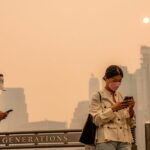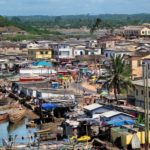Posts tagged with 'Coalition for Urban Transitions'
2024 has been a tumultuous year: More than half the world’s population went to the ballot box — some voting for radical change — extraordinary weather events have devastated communities and countries have been rocked by continued violent conflict. Given ...

Thousands of people in Quebec, Canada evacuated their homes this month due to raging wildfires. More than 400 miles away, New York City experienced its worst air quality in history, and briefly had the worst air quality of any city in the ...

To achieve more equitable, resilient, low-carbon societies, cities need big changes to critical infrastructure and systems. But ample research shows they can’t raise the investment needed for those big changes on their own. Municipalities depend on higher levels of government ...

Without getting cities right, we cannot solve the climate crisis. Contributing to 75% of energy-related greenhouse gas emissions, it is impossible to overstate their central role. Cities’ choices influence and can drive change in every system that needs to be decarbonized ...

National governments face an enormous triple challenge right now: recovering from COVID-19, creating sustainable and inclusive development, and addressing the climate crisis. New research shows that focusing on cities is key to overcoming these challenges while generating considerable economic, social and environmental benefits. A ...

Transport is the world’s fastest growing source of energy-related carbon emissions. It accounted for 23% of energy-related GHG emissions in 2010, and, within that, urban transport was the largest single source. Depending on where you live, transport also contributes anywhere ...

The UN Climate Action Summit in New York this week saw strengthened national climate commitments from 67 countries, but a disappointing showing from the world’s major economies. As national governments fall short, cities must continue to be climate champions. Indeed, ...

The world is facing a climate emergency, forcing us all to rethink the best way to spend resources, create jobs and improve quality of life for all. In these critical times, cities offer one of the biggest opportunities. With most ...

Over the past 50 years, transport planners have tended to focus on reducing congestion to improve people’s mobility within cities. But increasing road capacity, vehicle speeds and parking spaces have not solved urban traffic. Building more roads and parking just ...

Street lighting is important. It allows informal vendors and traders to operate for longer hours and improves road and public safety. It also makes streets feel safer and more secure, especially for women. But street lighting is sorely lacking in many of sub-Saharan Africa’s ...

Sustainable economic development in sub-Saharan Africa will only be possible if towns and cities across the region thrive. This column highlights the critical role that national governments need to play in guiding the urban transition. National Urban Policies can help ...

Amid the barrage of news about climate-related natural disasters and climate change summits, it’s important to recognize real inflection points—when there is truly cause to sit up and take note. The IPCC Special Report on Global Warming of 1.5ºC, released ...

Bold action on climate change could deliver $26 trillion in cumulative economic benefits by 2030, according to a new report by the New Climate Economy (NCE). Without immediate action to cut emissions, the costs of “runaway” climate change will be severe: ...

Climate change is already harming people’s health. In August last year, over 45 million people in India, Bangladesh and Nepal were affected by unprecedented monsoon flooding, while last year’s Atlantic hurricane season was the costliest on record. The scale of ...

Climate action is rarely a primary consideration when investments are made in cities. Roads and transport networks are built to improve mobility, homes to provide shelter, offices to create places to work. But with more than three-quarters of global emissions ...


























